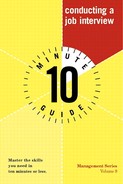0%
17Chapters
0-1Hours read
0kTotal Words
Book Description
If you have the responsibility of selecting and evaluating job candidates, this book will give you the tools to carry out an effective interview. Based on the philosophy that the best predictor of future success is past performance, the guide teaches you how to analyze a job, review a resume, and plan and maintain control of an interview. The list of sample questions will help you identify the right person for any job opening.
Table of Contents
- Copyright
- Introduction
- 1. Analyzing the Position
- 2. The Resumé
- 3. References
- 4. Testing
- 5. Interview Models
- 6. Structured Behavioral Interviewing: Part 1
- 7. Structured Behavioral Interviewing: Part 2
- 8. Controlling the Interview
- 9. Navigating the Legal Minefield
- 10. Active Listening Skills
- 11. Conducting the Interview
- 12. Critique and Fine Tune
- A. Sample Interview Questions
- B. Interview Evaluation Summary
- C. Glossary
